Gretchen and the Invisible Weight of Staying Whole
Gretchen is not the main character, nor part of the supporting cast. She doesn't have an arc. She barely gets screen time. But she broke my heart more than anyone else in Severance.
In a show thick with allegory and strangeness, Gretchen is the anomaly: ordinary, grounded, real. She has three kids, works night shifts as an emergency responder, packs swimsuit bags and makes cookies. She doesn’t symbolize a big idea, she just lives quietly. The only woman in the show with a normal life. A job. A family. Financial strain.
Every other woman in the show is far removed from this kind of life. Cobel is a senior scientist with total institutional power. Natalie is pure C-suite. Helena is rich enough to live untethered. She uses severance to gain her father’s approval, Devon is cushioned too – floating from one emotional side quest to the next, supporting Mark, raising her baby with ample help. In a very real way, they’re severed too – from the stakes of normal life.
In the world of Severance, some workers at Lumon Inc undergo surgery to split into two selves – an "innie" who works, and an "outie" who lives a normal life. The “innie” and “outie” personas are separate: they don’t share memories or feelings, only some general knowledge – the perfect setup to avoid leaks on sensitive projects. Some secret tech makes the switch when workers go through the elevator. innieDylan does the job. outieDylan comes home with the paycheck. iDylan crunches numbers, oDylan greets his wife Gretchen. The work happens on screen, but outside his awareness – he won’t remember a second of it.
Gretchen’s work stays offscreen too, as usual for a background character. We don’t follow her to the emergency dispatch desk where she works night shifts, we don’t see the calls she takes or the weight they leave. Like oDylan, she vanishes into labor – and returns, hollowed, to a house full of needs.
In most television, this dynamic would play out differently. The man would be the protagonist, and we’d follow him through the drama of his job. His fatigue would feel earned. The woman would arrive in the last ten minutes of the episode to nag him about dinner, and we’d roll our eyes on his behalf.
But Severance doesn’t let us follow anyone, and that absence levels the field: when both jobs are invisible, we’re left to notice what happens after. Who picks up the load. Who sees what’s missing.
So this essay is about Gretchen – and what Severance quietly reveals about work, memory, and care. About the unpaid labor that becomes more visible when no one’s paid labor is shown. About how, in the absence of spectacle, we finally see the weight women carry just to keep things going.
Severance is a fantasy, but whose?
Severance is sold as salvation, a way to separate the burdens of work from the pleasures of home. For oDylan, it works exactly as intended. He disappears into the void for eight hours and comes back with full credit. No memory of the labor, but all the prestige of identity: provider, worker, good man. It’s the fantasy of compartmentalization, modernized and institutionalized – the guy who doesn’t do the job, doesn’t feel the stress, but still gets the story. oDylan forgets. Everyone else fills in the blanks.
Gretchen’s job also happens offscreen, but she doesn’t get to leave anything behind. Her work doesn’t end with her shift. Instead, she walks into another job – one with no clock-out, no compensation, no forgetting. Field day lunches, backpacks, bills, laundry, toys, mess. Emotional regulation. Logistics.
Severance splits Dylan in two. Gretchen has to contain both halves at once. Worker and caregiver. Waged and unwaged. She’s fully integrated, not because she chose wholeness, but because there was no other option.
This is what makes the premise so sharp. When both characters' jobs are invisible, when both vanish from the narrative while at work, the return home feels like level ground. But it isn’t.
The Shift That Never Ends
Gretchen’s workday doesn’t end – it just relocates. She clocks out of one job and into another, swapping her headset for a grocery list. Sociologist Arlie Hochschild called this the "second shift": the unpaid, invisible labor women perform after their paid jobs end. Cooking, cleaning, parenting, emotional triage. Gretchen doesn’t get a rest shift, just a new costume.
It’s the usual fantasy: oDylan “provides” and she “nurtures.” He does the hard thing by walking into the Lumon office, while she... what? Does the exact same, actually – except she remembers it. And then doesn’t get to crash on the couch, because the cookies need baking, the pediatrician needs calling, the swimsuit needs to dry before Thursday and the lacrosse jersey before Friday. It’s not a softer life. It’s a longer one.
She shoulders the logistical spine of their family and the psychological scaffolding. She notices things before they become problems. She picks up slack before it hits the floor. She explains feelings to the children and to their father. And she does it all while her circadian rhythm is being ground into paste.1
This is what researchers call compassion fatigue. The erosion of empathy that happens when you spend too long caring for others without reciprocation or relief. It’s well-documented in emergency personnel, hospice workers, nurses. And mothers.
Simone de Beauvoir wrote about this decades ago in The Second Sex, calling it the myth of the "eternal feminine" – that women are made to be all things to all people. Infinitely nurturing, infinitely flexible, infinitely self-erasing. It’s not just mythology. It’s domestic policy.
And Severance doesn’t shout it – it whispers it. That’s what makes it brutal. The writers understood Gretchen so well that they didn’t need to spell her out. She doesn’t get a storyline. She gets a list of obligations – and that’s exactly the point.
So when she finally cracks – when she dares to feel something for the only version of her husband who actually sees her – she’s the one who ends up alone on the porch.
All you had to do was slice them
Let’s be clear: Gretchen isn’t cold. She’s exhausted.
She’s not nagging. She’s bracing.
Take the cookies, for example. In episode three, before heading to her night shift, Gretchen hands oDylan a tube of pre-made dough with the simplest of instructions: "All you have to do is slice them." It’s not a trap – it’s a gesture of trust. A small handoff, a low-stakes chance to help. But when she gets home, the dough’s untouched. The kitchen’s a mess. He’s on the couch. What should’ve been an easy win has quietly become a loss.
This is what burnout looks like. The version of her that used to explain, coax, try again? She’s still in there – but buried. You don’t stop reaching out because you don’t care. You stop because nothing changes.
People online love to say she should have listened more, supported more, been softer. But she tried. She talks to oDylan like someone trying to keep a dam from breaking – carefully, sparingly. The cookie dough wasn’t a test. It was a lifeline. A way to ask for help without setting herself up for heartbreak.
And still – he fails. Not just passively, but pointedly. In one scene, he makes himself a smoothie, then – mid-argument – dumps it into the sink. Leaves the blender half-full of sludge, unwashed, and walks away like it’s her problem. He creates not just a mess, but a message: I won’t be responsible for even this. It’s not just neglect anymore. It’s contempt.
So yes, she pulls back. She speaks less. She stops asking. That isn’t coldness – it’s a kind of armor. You can only be disappointed so many times before you start making smaller asks, then none at all.
Her burnout isn’t bitterness. It’s what builds up in the silence between the effort and the indifference. It’s what happens when you keep running the house, the relationship, the atmosphere – while your partner keeps proving he won’t meet you halfway.
oDylan’s pain is real; but Gretchen’s is quieter, heavier. Less legible. He gets to yell. He gets to storm off. She stays. She absorbs. She wipes down the counter.
Gretchen Is Grieving, Not Replacing
There’s a particular kind of heartbreak reserved for when someone you love is still physically present, still sharing your home, still leaving crumbs in the sink – but the version of them you fell in love with is long gone. That’s where Gretchen lives. Not in betrayal. In absence.
When she sees iDylan2, it’s not about lust or fantasy – it’s about memory. This is what oDylan used to be like: curious, open, admiring. There’s a flash of recognition, and then there’s the punch of loss. He sees her, asks questions, wants to be involved in the family. It's enough to wreck you, honestly. Not because she wants him instead – but because she wanted that from the man she already has. And didn’t get it.
That moment reframes both of them. iDylan isn’t just comic relief anymore – he’s lonely. Severed from context, denied even a name outside of work. He clings to Gretchen’s visits not because he’s in love with her, but because she reminds him of something warm, something human. oDylan floats above it all, disconnected. iDylan aches for entry.
But the grief belongs to Gretchen. Because she remembers it all. She’s the one who watched her partner recede day by day. She’s the one who reached out and got less back every time. What she feels for iDylan isn’t longing – it’s grief for what oDylan used to be. It’s that crushing realization that the connection she hoped would deepen over time has only faded. That the best parts of him now belong to someone who doesn’t get to live a full life. That she gave her love to someone who, in the end, wasn’t capable of returning it.
Gretchen is a plot device – but she’s an honest one. A mirror for Dylan, and for us. She represents exactly what we mean when we talk about women carrying the mental load, and the writing doesn’t flinch from it. Her grief is archetypal, but it never feels hollow. Every small detail – her quiet, her weariness, her restraint – lands because she’s written with care, and played with devastating precision. The show never gives her a monologue. Just a porch. Just silence. Just another moment she has to carry alone. And somehow, that says everything.
Would She Sever?
Sometimes I think about what it would look like if Gretchen got the chip – not that she’s been offered it, or does work that would justify it.
Would she take it?
Would she choose, finally, to forget the emergencies, the night shifts, the unpaid labor of keeping a life running? Would she hand off the stress to some inner-Gretchen who clocks in and clocks out, and come home to herself fresh, rested, whole?
Or would that feel like a loss too?
Because the thing is – and this is the cruel trick of emotional labor – the remembering is the care. The noticing. The context. The continuity. The love. Severance doesn’t just protect you from pain; it amputates your connection to meaning. It turns the dailiness of love into a blank shift on a timecard.
I think about this a lot. About the women I know who would take the chip in a heartbeat. And the ones who wouldn’t – not because they don’t want the relief, but because they know no one else will pick up the slack. Someone has to remember the milk. Someone has to know when it’s cookie day. Someone has to notice the mood shifts, keep the calendar straight, clean the blender. Someone has to absorb the weight.
Maybe that’s the quiet violence of severance: it offers a kind of freedom, but only to those whose absence wouldn’t collapse the entire structure. It’s easy to opt out when someone else is still opting in. For women – for mothers, for caretakers – the fantasy is harder to reach. Because their presence isn’t just a habit. It’s the glue.
I don’t know if Gretchen would sever. I think maybe she’d want to. She does need the break – but then would severance really help? Then her life would be perpetually coming home – to clean the blender, to slice the cookies, to keep the whole damn story moving – and I’m not sure that’s a more envious life than the one her innie would have.
Did you enjoy season 2? I have a lot of criticism — but as I said, Gretchen wasn’t one of them. Let me know what you thought of the show and of this post in the comments. If you’re reading this as an email, feel free to hit reply (only I will see it, and I promise to answer back!).
If you’ve enjoyed this post, you might also like:
There Is No TV Inside My Mind, or how i still love reading even though i can’t visualize anything when i close my eyes!
Don’t Show Me Your Spider Aliens, about physical descriptions of alien in scifi
Harry Potter became a cop; Percy Jackson fixed the system for more character analysis
Thank you to Matthew Beebe and Harrison Moore for helping me edit this piece, and to M.P. Fitzgerald for encouraging me to write it <3
Studies show night shift work is directly correlated with higher rates of anxiety and depression in women. But sure, let’s worry about oDylan’s self-esteem.
Remember: Milchick allows “conjugal visits” for iDylan to keep him occupied and prevent him from rebelling again with iMark. Gretchen gets to see iDylan a few times, to talk, hug and show pictures of their children



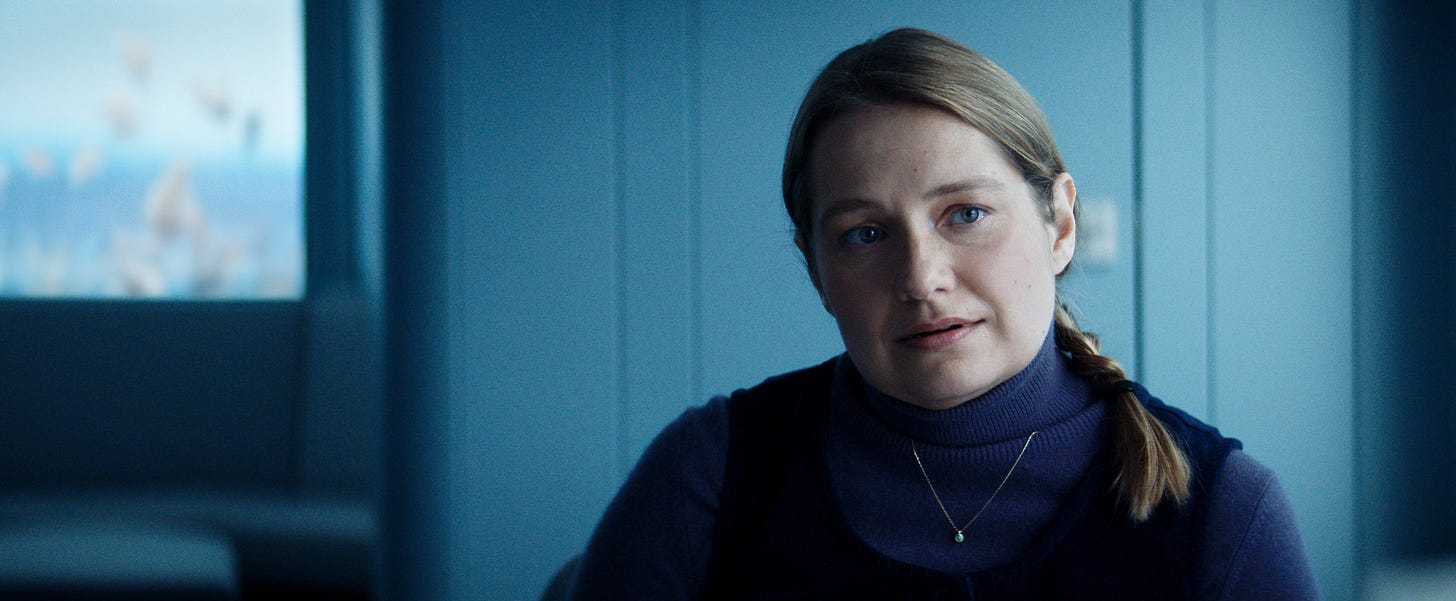
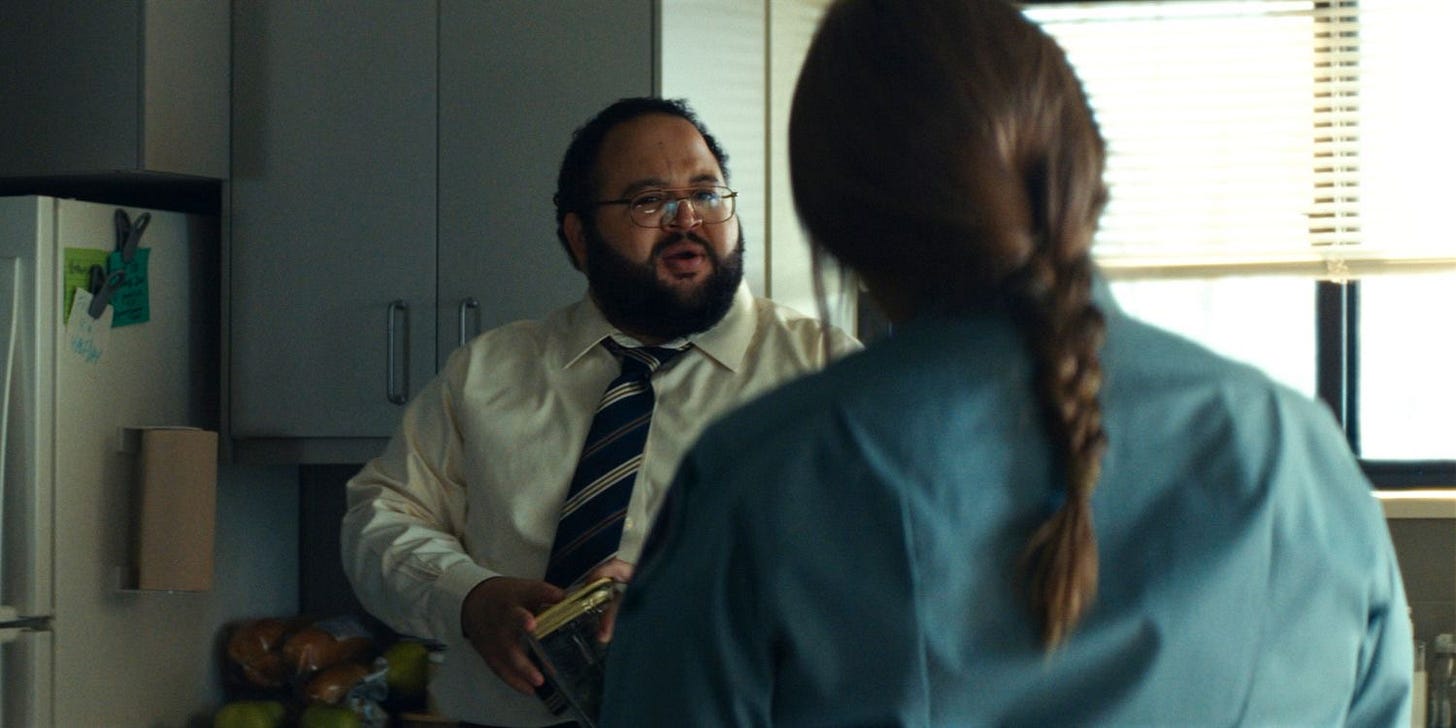
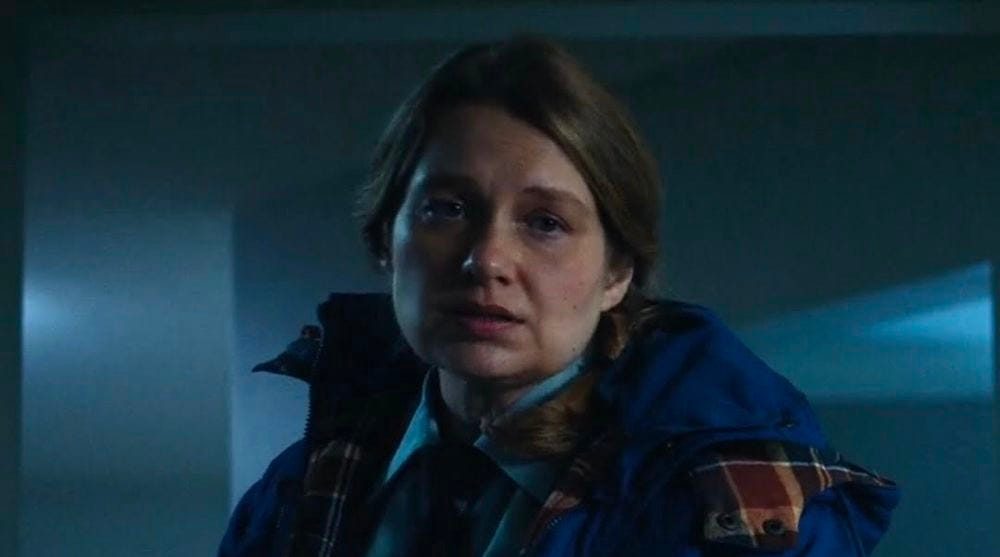
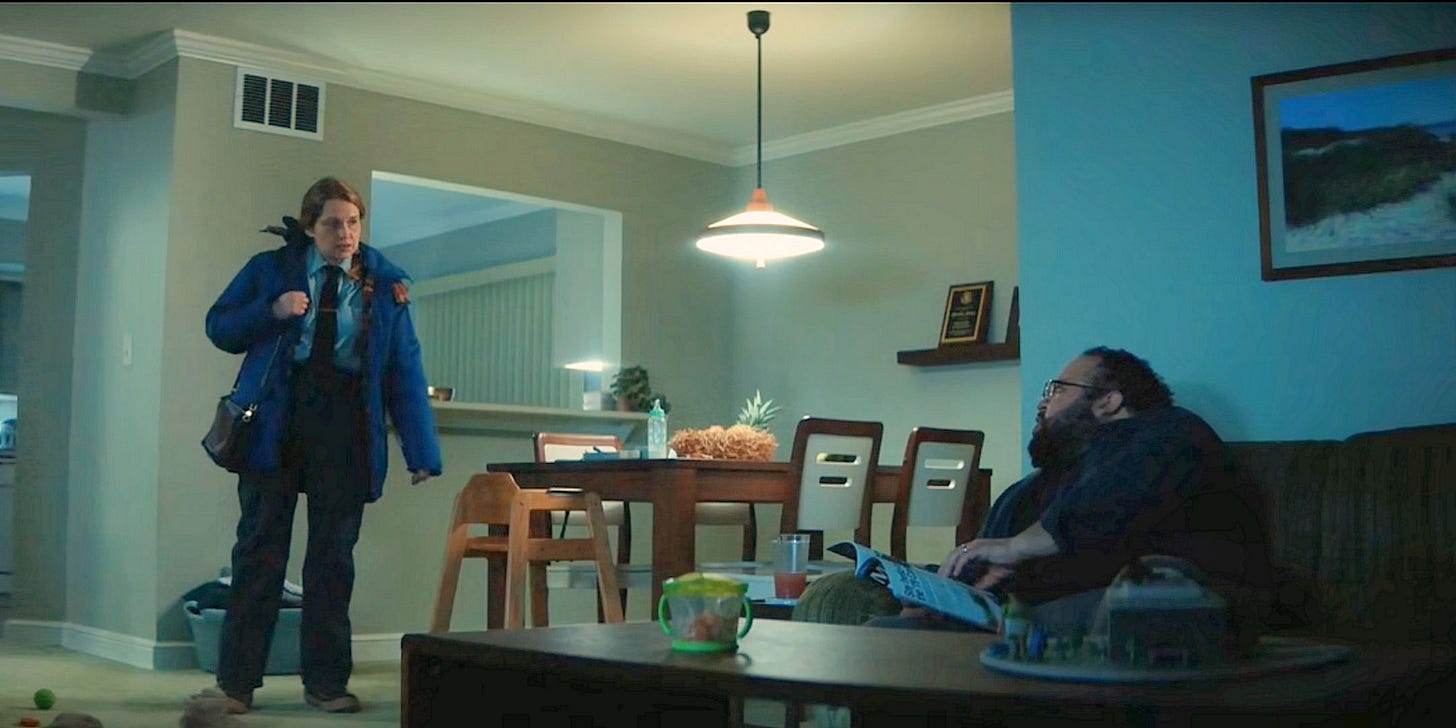
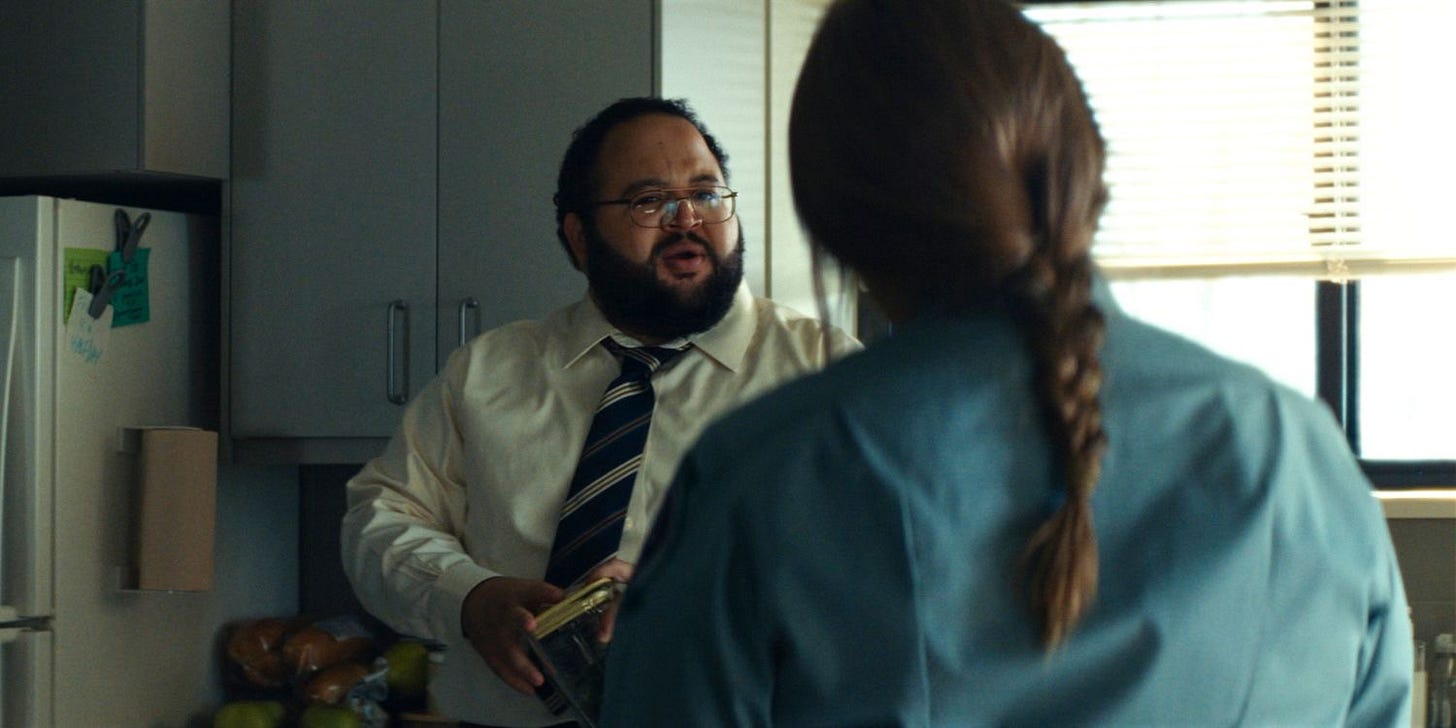

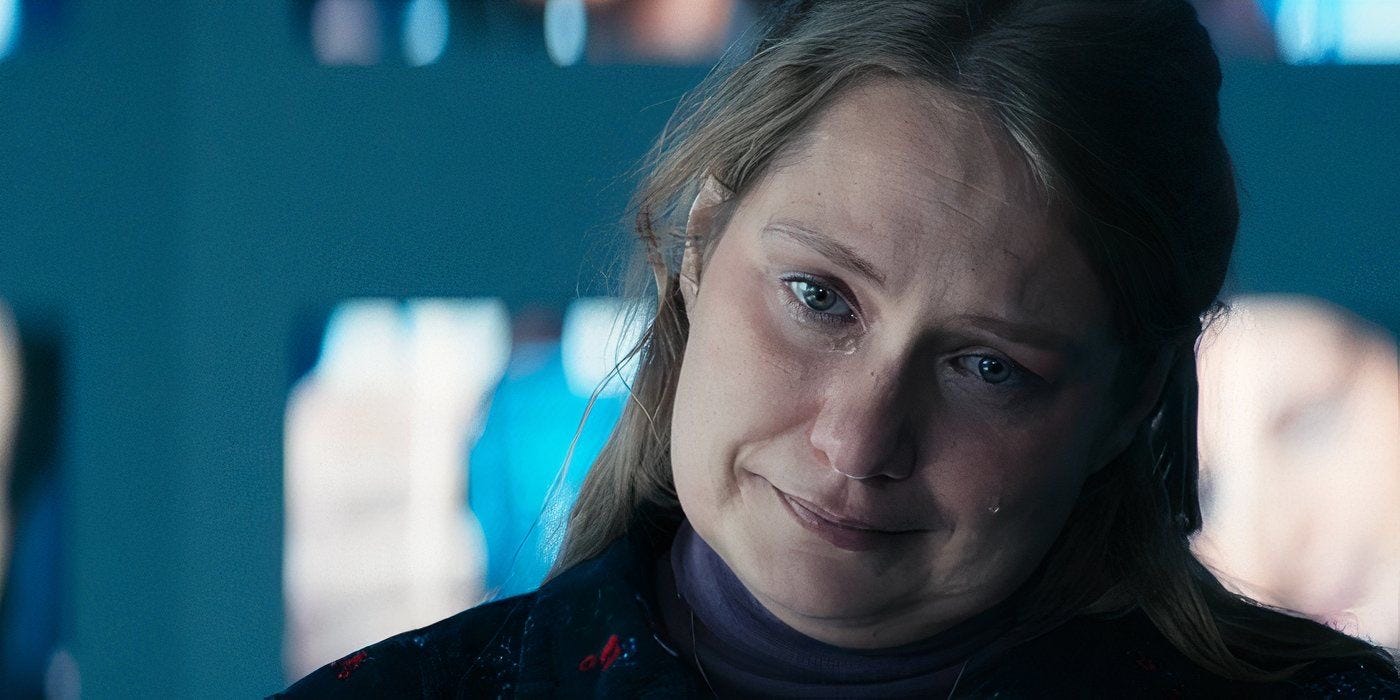

I hadn't fathomed Gretchen to this degree as her existence (as you pointed out) was a plot device - the audience clutching their pearls at oDylan while sidelining his counterpart's grief.
Astute analysis.
Love this analysis of Gretchen, been there. Painful.